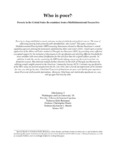Who Is Poor? Poverty in the United States Re-examined from a Multidimensional Perspective

View/
Author
Juneau, John Joseph
Subject
Washington and Lee University, Shepherd Poverty Program
Capabilities approach (Social sciences)
American Community Survey
Poverty -- Research
Metadata
Show full item recordDescription
John Joseph Juneau is a member of the class of 2018 of Washington and Lee University. Capstone; [FULL-TEXT FREELY AVAILABLE ONLINE] Poverty is a long-established economic outcome worthy of scholarly and political concern. The issue of addressing poverty deals primarily with identification: who is poor? This paper constructs a Multidimensional Poverty Index (MPI) assessing dimensions relevant to Martha Nussbaum's central capability approach utilizing the framework established by Alkire and Foster (2011). I build upon a similar application of the Alkire and Foster method in Dhongde and Haveman (2015) by providing more sufficient conceptual support for the inclusion of dimensions in the specification and selecting different thresholds for some variables with more robust justification for this selection than the original authors provide. In addition, I make the case for examining the MPI by identifying any person deprived in at least one dimension as poor. My empirical analysis further improves on the work of Dhongde and Haveman by utilizing sample weights present in the American Community Survey (ACS). I estimate my specification of the MPI using one percent samples from the ACS for 2015, and I provide decompositions of the estimate for race, sex, and age by state. I find that 72 percent of Americans are poor such that the poor experience about 18 percent of all possible deprivations. Moreover, I find large and statistically significant sex, race, and age gaps that vary by state. John Juneau II